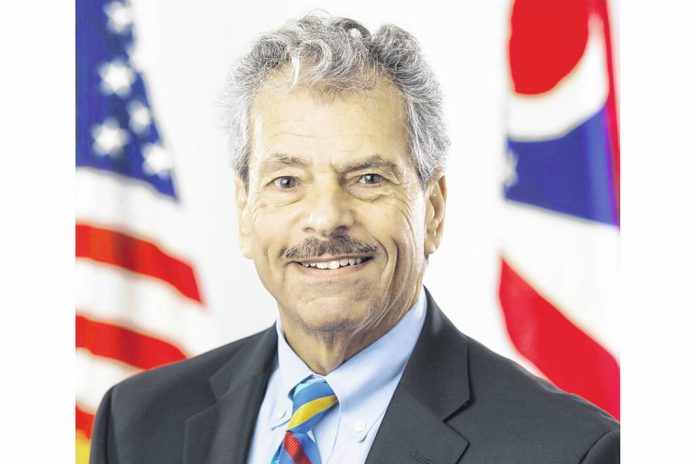
Sam Randazzo, the former Public Utilities Commissioner of Ohio, surrendered Monday in connection with a $60 million bribery scheme related to a legislative bailout for two Ohio nuclear power plants that has already resulted in a 20-year prison sentence for a former state House speaker.
AP Photo/Ohio Governor’s office via AP
COLUMBUS, Ohio — Ohio’s former top utility regulator surrendered Monday in connection with a $60 million bribery scheme related to a legislative bailout for two Ohio nuclear power plants that has already resulted in a 20-year prison sentence for a former state House speaker.
Sam Randazzo, former chair of the Public Utilities Commission of Ohio, self-surrendered at U.S. District Court in Cincinnati after being charged in an 11-count indictment that was returned on Nov. 29, U.S. Attorney Kenneth L. Parker’s office announced. Randazzo was scheduled for an initial court appearance later in the day.
“Today’s indictment outlines an alleged scheme in which a public regulatory official ignored the Ohio consumers he was responsible for protecting, instead taking a bribe from an energy company seeking favors,” FBI Cincinnati Special Agent in Charge J. William Rivers said in a statement.
Randazzo, 74, resigned in November 2020 after FBI agents searched his Columbus townhome and FirstEnergy revealed in security filings what it said were bribery payments of $4.3 million for his future help at the commission a month before Republican Gov. Mike DeWine nominated him as Ohio’s top utility regulator.
He faces one count of conspiring to commit travel act bribery and honest services wire fraud, two counts of travel act bribery, two counts of honest services wire fraud, one count of wire fraud and five counts of making illegal monetary transactions.
A message seeking comment was left for his lawyer. If convicted as charged, the defendant could face up to 20 years in prison.
Ohio Consumers’ Counsel Maureen Willis, who represents the state’s utility ratepayers, said the indictment was “an important first step to bring justice to Ohio utility consumers” — but that more is needed.
“It underscores the need for near-term reform of the PUCO selection process that led to his appointment as Chair of the PUCO,” Willis said in a statement. “OCC’s calls for reform so far have gone unanswered. Ohioans deserve better from the public officials in this state.”
The long-awaited indictment marks the latest development in what has been labeled the largest corruption case in Ohio history.
Former Ohio House Speaker Larry Householder was sentenced in June to 20 years in prison for his role in orchestrating the scheme, and lobbyist Matt Borges, a former chair of the Ohio Republican Party, was sentenced to five years.
The U.S. attorney’s office in Cincinnati indicted three others on racketeering charges in July 2020. Lobbyist Juan Cespedes and Jeffrey Longstreth, a top Householder political strategist, pleaded guilty in October 2020. The third person arrested, statehouse lobbyist Neil Clark, pleaded not guilty before dying by suicide in March 2021. The dark money group used to funnel FirstEnergy money, Generation Now, also pleaded guilty to a racketeering charge in February 2021.
All were accused of using the $60 million in secretly funded FirstEnergy cash to get Householder’s chosen Republican candidates elected to the House in 2018 and then to help him get elected speaker in January 2019. The money was then used to win passage of the tainted energy bill, House Bill 6, and to conduct what authorities have said was a $38 million dirty-tricks campaign to prevent a repeal referendum from reaching the ballot.
For Randazzo’s part, prosecutors allege that in November 2019, he included language in a PUCO opinion and order to address a concerning issue FirstEnergy had coming up in 2024.
“Stock is gonna get hit with Ohio 2024. Need Sam to get rid of the ‘Ohio 2024 hole,’” an energy executive text message read. Another messaged that they had spoken to Sam and he “(t)old me 2024 issue will be handled next Thursday.”
The next Thursday, the PUCO decision included language alleviating the 2024 issue.
An 81-page FBI criminal complaint from July 2020 detailed how executives of Akron-based FirstEnergy interacted with Householder and others indicted in the scheme, including 84 phone contacts between Jones and the former speaker and 14 phone contacts between Dowling and Householder.
FirstEnergy admitted to its role in the bribery scheme as part of a July 2021 deferred prosecution agreement with the U.S. Department of Justice. The company agreed to pay $230 million in penalties and to accomplish a long list of reforms within three years in order to avoid being criminally prosecuted on a federal conspiracy charge.
A statement of facts signed by current FirstEnergy CEO and President Steven Strah lays out in detail the involvement of Jones, Dowling, Randazzo and others in the bribery scheme. Randazzo’s attorneys have called claims contained in the document mere “hearsay” designed to keep the energy giant out of legal hot water.






